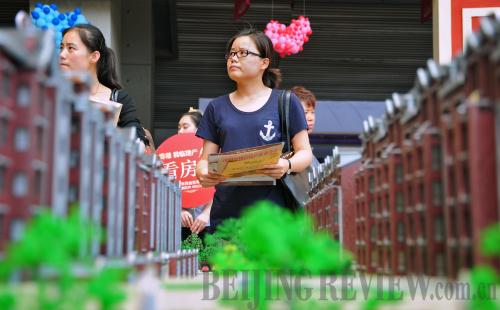|
 |
|
SEEKING A HOME: A homebuyer ponders at a real estate fair in Shenyang, Liaoning Province, on July 6 (JIANG BING) |
Pork prices in July, for example, were 56.7 percent higher than they were 12 months ago. Food prices make up about a third of China's CPI basket.
Facing rising consumer prices, many so-called middle-class residents have started taking measures to cut back on their spending.
"I spend as little as possible because the consumer prices keep rising, but my salary does not," said Zhang Cheng, a 28-year-old office worker who works in a foreign-funded company in Beijing and earns about 6,000 yuan ($941) a month. "I spend less on clothing and take buses or the subway more than taxis. I only eat cheaper fruits, such as watermelon and apples now, whereas I didn't care about the price of fruit before."
For many young people who are categorized in the middle class, rising food prices are just a part of their expenditure-related worries. They also find themselves burdened by the surging cost of accommodations, transportation, cosmetics and consumer goods, according to a recent report by Xinhua News Agency.
For example, taxi fares in Shanghai and Shenzhen, a boomtown in southern Guangdong Province, increased sharply in May, and the rent in Guangzhou had jumped 13.3 percent over the past year, the report said.
Price increases are also affecting essential services such as health care and education. Official data showed the price of health care rose 4.2 percent in Guangdong in May, while the average personal expenditure on education and training reached 653 yuan ($102), an increase of 11.6 percent from the previous year.
These soaring prices not only inhibit middle-class residents' ability to consume but also reduce people's general sense of well-being.
Unfortunately, inflation will remain high in the third quarter as food prices and labor costs continue to surge, warned Cao Yuanzheng, chief economist of BOC International (China) Ltd. He also predicted the whole year's CPI might amount to 5 percent, which is considerably higher than the 4-percent target set by the government at the beginning of the year.
Heart-broken homes
Rising property prices, in particular, have had a crippling effect on China's middle-class population. For most young people in major cities, owning a home is increasingly difficult.
Hou Jie, a 34-year-old senior consultant with APTech, a well-known computer education provider in China, said his nightmare began with his purchase of an apartment.
Hou earns 12,000 yuan ($1,881) a month. Before purchasing his apartment, Hou was able to afford a car, regular meals, luxury goods and lots of travel around China with his girlfriend.
In preparation for marriage, Hou started looking to buy an apartment in 2007. As he wanted enough space to live with his parents, spouse and future offspring, he was keen to buy a medium-sized home. But Hou's savings of 300,000 yuan ($47,026) were not enough for the down payment on a 100-square-meter apartment in downtown Beijing at the time.
According to the NBS, housing prices in 70 cities rose 7.6 percent from 2006 to 2007. Inside Beijing's Fourth Ring Road, the price for apartments reached 20,000 yuan ($3,135) per square meter. In just one month in 2007, housing prices soared 3,000 yuan ($470) per square meter.
"Facing the surging prices, I thought no matter how much I earned, I wouldn't be able to afford a home," Hou said, adding he decided to wait.
At the end of 2008, Hou bought a 120-square-meter apartment outside Beijing's North Fifth Ring Road for 2.2 million yuan ($345,000). He had to borrow 200,000 yuan ($31,350) from his father to make the down payment.
But his problem had just begun. He now pays 80 percent of his monthly salary to make his mortgage payments. He will need to spend more than 9,300 yuan ($1,458) a month in the next 25 years to pay off the debt on his home.
To cut daily costs, Hou said he and his wife had given up on elements of their previously comfortable lifestyle. He sold his car. The couple's discretionary spending is now limited to 1,000 yuan ($157) a month. "Now I have to try my best to avoid going out for social activities with friends after work or during the weekend," Hou said.
However, the surging inflation in the past two years has increased his burden. Hou said he and his wife had also stopped shopping for food at the neighborhood supermarket and started searching for cheaper farmers' markets on the outskirts of the city.
The Hou family's austerity program is so severe that they no longer consume pork and expensive vegetables. "We have forgotten the taste of pork," he joked.
| 